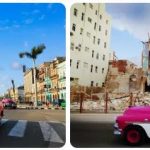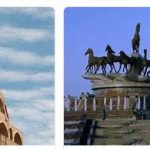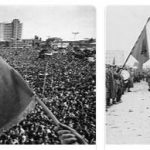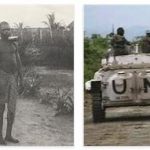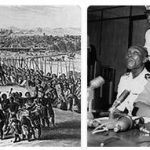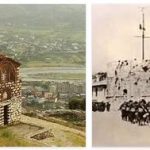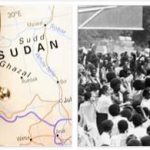The problem of the institutional normalization of the regime was therefore solved: in February 1976 a new Constitution was approved which consecrated Cuba as the first socialist state in America. Meanwhile, the line of close collaboration with the USSR pushed Havana towards a policy of military support for Moscow’s plans to penetrate the Third World. Particularly active was the Cuban presence in Africa, where an expeditionary force of several thousand men allowed the affirmation of pro-Soviet regimes in some countries (Angola, Mozambique, Ethiopia). New clashes with the USA occurred in October 1983 with the American invasion of Grenada, where there were numerous Cuban military advisers, and over the issue of Sandinista Nicaragua, actively supported by Castro Ruz; after start of negotiations concerning migration between the two countries (1985), these relations experienced a further involution. Despite the large rejuvenation in the composition of the Central Committee and the Politburo in February 1986, the indications for greater political and economic liberalization proposed by the new Soviet leadership did not find resonance in Cuba to the extent desired: to the embarked withdrawal (1989) of the troops from ‘ Angola and Ethiopia, in the same year, corresponded to the purge of the internal “institutional” opposition as well as the explicit rejection of measures to reform the power structure, considered harmful to socialism.
However, the election of Cuba as a member of the Security Council of the UN (despite the accusation of violation of human rights), supported by numerous Latin American countries, attenuated his isolation from a diplomatic point of view. Seriously damaged in its commercial relations by the dissolution of COMECON (1991), Cuba therefore saw Soviet support cease as a consequence of the fall of communism in the USSR (then followed, in December 1991, by the breakup of the Soviet Union). To the collapse of an economy deprived of international aid and the loss of internal consensus, Castro Ruz, at the IV congress of the Cuban Communist Party (October 1991), opposed a modest opening, in economics, to private initiative and a reorganization of the bureaucratic apparatuses which, without undermining the role of the single party, of reiterated Marxist-Leninist faith, introduced some elements of democratization (disappearance of the secretariat of the Central Committee, direct election of the members of the National Assembly) in the Cuban political system. These measures, however, were not sufficient to curb the haemorrhage of consent to the regime which was suffering the setback of mass emigration to the United States.
According to usaers, the same economic situation, with the tightening of the US embargo, it showed no signs of improvement and in 1993 Fidel Castro tried to break the isolation with an initiative aimed at ingratiating himself with the governments of the American continent (invitation to guerrilla formations to abandon the armed struggle to seek solutions policies to their claims). A similar policy of detente was also pursued within the country and found its first concrete manifestation in the reconciliation conference held in Havana (1992) in the presence of over 200 political opponents in exile. In 1994 and 1995, Fidel Castro’s attempt to use the threat of mass emigration (in August 1994 ca.30. 000 refugees tried to reach the coasts of Florida) as an instrument of pressure on Washington did not lead to the desired solutions, but worsened relations between the two administrations. Still in 1996, in search of international solidarity towards such a singular experience, Castro also opened up to the Catholic Church, inviting the pontiff to visit Cuba. At the beginning of 1998 John Paul II went to Cuba, where he was welcomed with great enthusiasm. In the numerous speeches he gave to the crowd, between 21 and 25 January, Wojtyla claimed full political citizenship of Catholics but also the right of expression and association for all lay people, the two issues that were most important to him. He also remembered, albeit with caution, the great drama of prisoners and exiles, hoping for a gesture of leniency on the part of the Cuban leader. In February, two hundred detainees returned to freedom: a tribute to the pontiff, who during his visit had indicated the way to a peaceful transition by condemning the injustice of the US embargo, but above all the demonstration that Fidel Castro had decided to build an alliance relationship with the Catholic Church to ensure the country an evolution towards a system that would safeguard the social achievements of Castroism by guaranteeing greater pluralism.
The Human Rights Commission’s denunciation of the resumption of trials against other opponents, just as the Havana government boasted the release of prisoners, seemed to contrast with the new political turnaround, but the spokesman for the Cuban foreign minister underlined the substantial difference between those who the foreign press defined as political prisoners and who, according to Cuba, were counter-revolutionaries. In the meantime, the pontiff’s mediation action continued between the United States and Cuba, but Washington reiterated its no to the easing of the embargo. However, a sign of mutual openness was given by the visit to Cuba carried out by J. Carter (the first former US president to be received by Fidel Castro) in May 2002. In January 2005, the EU suspended the sanctions decided in 2003, after the arrest of dissidents. In 2006, a political and economic alliance pact was signed with Venezuela and Bolivia, with the aim of countering US influence in Latin America. In July 2006, following a delicate intervention, Fidel Castro handed over his powers to his brother Raúl and in 2008 he renounced all political posts. In February the brother was elected president. In March 2012, Benedict XVI he visited the country, meeting Raúl and Fidel Castro. In 2014, a law was approved to encourage foreign investment, while in 2015, following the thaw in diplomatic relations between Cuba and the United States, their respective embassies reopened. Also in the same year, in September, Pope Fancesco went to the country. In 2016 Fidel Castro died. In 2018, M. Díaz-Canel was elected president. In 2019, a change was made to the Constitution and M. Marrero Cruz was elected premier. In July 2021, a vast revolt broke out against the government and the Cuban Communist Party, caused by the economic crisis linked above all to the contraction of tourism and the lack of adequate measures to deal with the Covid-19 pandemic.

